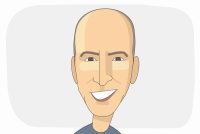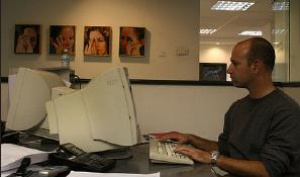It was at the beginning of the Al Aqsa intifada, and at the time I was working as a chief night editor at Haaretz. Those were some of the most intense days in my career in journalism.
I remember the images shown over and over again on television. The body being thrown out the window, and then being stomped on. And of course the bloody hands. Those red hands and the smile that came to symbolize so much more.
The lynching really brought it home, how deep the hatred was. The people in Ramallah behaved like animals. There was something primal there. It was hatred that had taken over them, that totally blinded them. You couldn’t be indifferent to it. And nobody was.
My leftism split in two. I turned more to the left, because I saw even more urgency in ending the occupation, the cause for such hatred. But I also went a bit “right”, as if saying to myself back in those days: “Fine, I don’t want to be your friend either.” And I really didn’t. I was angry. And as the intifada snowballed, I began to think that the only people more screwed up than Israelis were the Palestinians themselves. I still do.
Those were hard days for everyone. It goes without saying that the Palestinians had it (and still do) the hardest of all. But it was hard to live in Israel too. The tensions were amazingly high. People you knew were dying in suicide attacks. Buses passing too close could send chills down your spine. And people smiled less. There seemed to be an “intifada frown” going around.
It was hard for soldiers, it was hard for paramedics, it was hard for ZAKA personnel who gathered body parts at terror sites.
Working at the paper back then had its toll, too. I’ve always thought that journalists never received enough attention for what they themselves were going through at the time, covering the bloodshed and bombings. I don’t want to sound like a weakling, and certainly not indifferent to the pain of the real victims on both sides, but it was traumatic for us, too. For me, that period was one of the most nerve wracking things I’ve ever been through.
Every night I prayed an attack wouldn’t happen on my shift. We’d joke, black humor style, “Let it happen early this time, not two hours before the deadline. We can’t take any more cliff hangers”. But the militants didn’t care much about deadlines. And each time an attack came when I was heading the night desk, I felt like I aged a few years.
Send out the reporters. Change the layout. Get the editors ready. We waited for our copy like the nurses at the ER were waiting for their wounded.
Then the pics came in. I had to decide which ones were publishable, or too graphic. But we had to show the site.
And then we had to get the mug shots. Send the reporter or photographer to take a picture of the loved ones. If there were over 10 it was hard to get them all on the front page, or at least above the fold. So I had to think of creative ways to get around it. “Maybe some on the front page, or some inside”? Should I stack them horizontally? Vertically? What if I can’t get them all up over the fold? I don’t want anyone thinking their loved ones are less important.
And there I was sitting in front of the Mac, swerving the mouse and dragging one dead guy to here, one dead woman to there. “Nah, this doesn’t work. Shouldn’t the pregnant woman be above the old guy? And should the soldier be below the citizens?”
And then came the nightmares. I started seeing the mugshots in dreams. In fact, I still have some of those faces imprinted somewhere on my brain. That’s when I knew I had to take a break from the paper. And I did, eventually.
But between all those mugshots, I still see those bloody hands from Ramallah.
I don’t want to shake them. I just want to get rid of them. Not for their sake. For mine.


